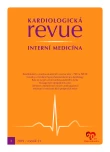-
Medical journals
- Career
Management of dyslipidaemia in women
Authors: Šatný M.; Vrablík M.
Authors‘ workplace: Centrum preventivní kardiologie, III. interní klinika – klinika endokrinologie a metabolismu 1. LF UK a VFN v Praze
Published in: Kardiol Rev Int Med 2019, 21(2): 73-77
Overview
There has been a marked decline in cardiovascular (CV) mortality in recent decades, but despite extensive preventive measures and new treatment modalities, these are the leading cause of death in developed countries, especially among women. It is known that dyslipidaemia is the most significant risk factor of atherosclerotic CV diseases for the female population, which typically occur together with dyslipidaemia during menopause. The key parameter of the lipid profile is LDL-cholesterol (independent of gender), but in some studies, a narrow association of CV risk with HDL-cholesterol or triglycerides is also found in women. According to the current guidelines for the management of dyslipidaemia there are no specific outputs for the female population; separate chapters are menopause, indication of oral contraceptives, hormonal replacement therapy or pregnancy. The guidelines explicitly mention a thorough CV risk assessment to avoid unnecessary initiation of treatment in low-risk patients. The LDL-cholesterol goals correspond to the CV risk categories; the basis of the treatment are statins, which can be combined with other lipid-lowering drugs as needed.
Keywords:
combination therapy – pregnancy – female population – diagnosis and treatment of dyslipidaemia – oral contraceptives – hormonal replacement therapy
Sources
1. Zemřelí 2017. Praha: ÚZIS ČR 2018.
2. Cífková R, Krajčoviechová A. Dyslipidemia and cardiovascular disease in women. Current cardiology reports 2015; 17(7): 609. doi: 10.1007/ s11886-015-0609-5.
3. Yusuf S, Hawken S, Ôunpuu S et al. Effect of potentially modifiable risk factors associated with myocardial infarction in 52 countries (the INTERHEART study): case-control study. Lancet 2004; 364(9438): 937–952. doi: 10.1016/ S0140-6736(04)17018-9.
4. Vaccarino V, Parsons L, Every NR et al. Sex-based differences in early mortality after myocardial infarction. N Eng J Med 1999; 341(4): 217–225. doi: 10.1056/ NEJM199907223410401.
5. Seshadri S, Beiser A, Kelly-Hayes M et al. The lifetime risk of stroke: estiamates from the Framingham Study. Stroke 2006; 37(2): 345–350. doi: 10.1161/ 01.STR.0000199613.38911.b2.
6. World Health Organization. The world health report 2002: Reducing risk, promoting healthy life. Geneva: World Health Organization 2002.
7. Jozífová M, Cífková R, Lánská V et al. Porovnání léčby hypertenze a rizikového profilu hypertoniků v obecné populaci a na specializovaném pracovišti. Cor Vasa 2003; 45(11): 533–541.
8. Feingold K, Brinot EA, Grunfeld C. The effect of endocrine disorders on lipids and lipoproteins. In: De Groot LJ, Chrousos G, Dungan K et al. (eds) Endotext. South Dartmouth (MA): MDText.com, Inc.; 2000. Available at: https:/ / www.ncbi.nlm.nih.gov/ books/ NBK409608.
9. Šatný M, Vrablík M. Dyslipidemie u vybraných endokrinopatií. Kardiol Rev Int Med 2018; 20(3): 188–196.
10. Margolis K, Adami H, Lou J et al. A prospective study of oral contraceptive use and risk of myocardial infarction among Swedish women. Fertil Steril 2007; 88(2): 310–316. doi: 10.1016/ j.fertnstert.2006.11.
206.11. Chakhtoura Z, Canonico M, Gompel A et al. Progestogen-only contraceptives and the risk of acute myocardial infarction: a meta-analysis. J Clinl Endocrinol Metab 2011; 96(4): 1169–1174. doi: 10.1210/ jc.2010-2065.
12. Catapano AL, Graham I, De Backer G et al. 2016 ESC/ EAS Guidelines for the management of dyslipidaemias. Eur Heart J 2016; 37(39): 2999–3058. doi: 10.1093/ eurheartj/ ehw272.
13. Bateman BT, Hernandez-Diaz S, Fischer MA
et al. Statins and congenital malformations: cohort study. BMJ 2015; 350 : 1035. doi: 10.1136/ bmj.h1035.14. Toth P, Phan BA. Dyslipidemia in women: etiology and management. Int J Womens Health 2014; 6 : 185–194. doi: 10.2147/ IJWH.S38133.
Labels
Paediatric cardiology Internal medicine Cardiac surgery Cardiology
Article was published inCardiology Review

2019 Issue 2-
All articles in this issue
- Vzpomínka na prof. Miloše Štejfu (28. 5. 1929–20. 5. 2015)
- News about familial hypercholesterolaemia for cardiologists
- Update of the role of Lp(a) in determination of the CV risk and methods of influencing it
- Lipid variability
- Management of dyslipidaemia in women
- Mechanical circulatory supports – basic principles and clinical evidence
- Beta-blockers in cardiovascular diseases – Pros and Cons
- Safety and efficacy of new anticoagulants in real world clinical practice
- Creation and verification of a nursing standard of patient education after myocardial infarction
- Smoking – an influenceable risk factor in heart and vessel diseases
- Cardiology Review
- Journal archive
- Current issue
- Online only
- About the journal
Most read in this issue- Beta-blockers in cardiovascular diseases – Pros and Cons
- Update of the role of Lp(a) in determination of the CV risk and methods of influencing it
- Mechanical circulatory supports – basic principles and clinical evidence
- News about familial hypercholesterolaemia for cardiologists
Login#ADS_BOTTOM_SCRIPTS#Forgotten passwordEnter the email address that you registered with. We will send you instructions on how to set a new password.
- Career

